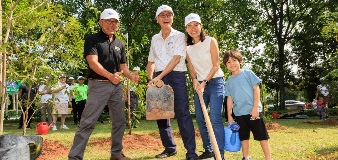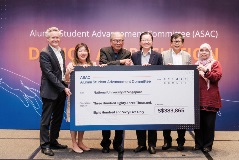Non-profit organisation Conservation International gifted scholarships supporting the Master of Science in Biodiversity Conservation and Nature-based Climate Solutions.

CI Climate Policy Scholar, Ms Shakura Nuha Binte Bashir, discussing her policy work with colleagues at Conservation International. ©Conservation International
Southeast Asia is a biodiversity hotspot with an abundance of natural resources. Millions of people in the region depend on this rich endowment to thrive, but now complex environmental challenges threaten the survival of both people and the planet.
Success in conservation efforts requires a mix of effective leadership, a relentless dedication to protecting the natural environment and innovative interventions. In these unprecedented times, conservation leaders must harness innovative nature-based solutions and drive participation from diverse communities to co-create equitable and tangible solutions that protect nature for the long term.
Nurturing leaders across Southeast Asia could be a gamechanger for sustainability. With this in mind, non-profit organisation Conservation International (CI) has gifted scholarships supporting the Master of Science in Biodiversity Conservation and Nature-based Climate Solutions (MSc BCNCS), a new programme under the NUS Department of Biological Sciences. The Conservation International Scholarship will give preference to financially needy students and those from countries within Southeast Asia.
The programme's courses combine fieldwork with science, policy and finance innovations. CI believes that this interdisciplinary curriculum would empower aspiring young conservationists to address environmental challenges in the region.
“Conservation efforts within Singapore alone is not enough to mitigate or prevent the impacts of global environmental crises such as climate change,” said Dr Richard Jeo of Conservation International.
“We want to build that capacity among communities and geographies where there is high potential for conservation and opportunity to do that kind of work,” the Senior Vice President of the Asia-Pacific Field Division added.
CI hopes that the scholarships will nurture and seed the growth of future changemakers who will go on to effect positive change for the long-term benefit of people and all life on Earth.
“We hope these young conservation leaders would move on to achieve great outcomes, such as to protect forests, the ocean, and other carbon-rich and highly threatened ecosystems, stamp out the illegal wildlife trade, build sustainable business models and best practices, and even contribute to a robust market for carbon credits,” Dr Jeo elaborated.
Issues, such as air pollution and illegal wildlife trafficking, are global problems and all countries and their citizens have a role to play. Education, detection tools and a wider sharing of best practices solutions are required to tackle these issues, Dr Jeo said.

Ms Shakura Nuha Binte Bashir, CI Scholar and MSc BCNCS student conducting a blue carbon survey at Changi Beach, Singapore. ©Shakur Bashir
Effective leadership is also needed to steer conservation programmes and efforts. “It involves commitment and dedication to protecting the environment,” Dr Jeo shared.
“By providing accessible and science-based tools and mobilising the participation of all stakeholders, we hope to scale the impact on combating global environmental problems such as climate change.”
CI and NUS have a shared vision of a sustainable planet, where biodiversity and thriving societies coexist, shared Associate Professor Roman Carrasco of the NUS Department of Biological Sciences.
The contributions of CI to MSc BCNCS occur on various levels. Several students have joined CI’s internship programmes. CI experts have also guest lectured for NUS modules, offering insights on conservation finance and their management of conservation projects, Prof Carrasco shared.
Prof Carrasco sees both organisations joining forces to support evidence-based decisions in Singapore and the region as the programme matures.
“We hope to create a network of professionals with solid theoretical and applied foundations to contribute to sustainability transitions in government agencies, companies and NGOs,” Prof Carrasco elaborated.
“This is critical in a time in which a rethinking of the economy towards decarbonisation is urgently necessary to combat climate change,” he added.






